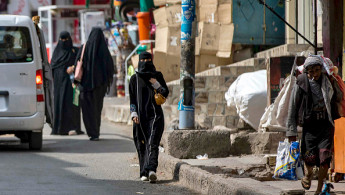North Yemen: male guardianship laws restrict vital aid work
Female aid workers in north Yemen cannot do their jobs tackling one of the world's worst humanitarian crises as tightening male guardianship rules by Houthi authorities restrict their movement, nine female humanitarians told Reuters.
When women refuse to take a guardian, they cannot travel to oversee aid projects, collect data and deliver health and other services. When women do take one, gender-sensitive work is difficult and aid budgets must bear extra costs.
One health project manager normally conducts 15-20 visits a year to projects around the country but said she has not made any since the rules requiring Yemeni female aid workers be accompanied by a close male relative - a "mahram" in Arabic – came out a year ago.
"I don't have a lot of men in my family," she said, adding that some women struggle to find willing guardians because relatives are against her working. "Sometimes a woman works without informing someone in her family."
She improvises with video calls, but knows other women have lost jobs because they cannot work effectively.
Yemen's conflict has divided the country between the Iran-aligned Houthis in north Yemen and an internationally recognised government in the south, supported by a Saudi Arabia-led military coalition.
The conflict has wrecked the economy and destroyed the health system, leaving two thirds of Yemen's 30 million population in need of humanitarian assistance. Aid groups say female-headed households are more vulnerable to food insecurity and difficulties accessing aid.
Without female staff in the field, aid groups say they have trouble doing things as simple as identification checks on women, who may need to lift their face veils, to distribute food aid.
"Mahram requirements are making it even more challenging for humanitarian interventions to reach the most marginalised female programme participants," said one representative of an NGO that works on nutrition and sanitation.
Reporting by Reuters





 Follow the Middle East's top stories in English at The New Arab on Google News
Follow the Middle East's top stories in English at The New Arab on Google News


